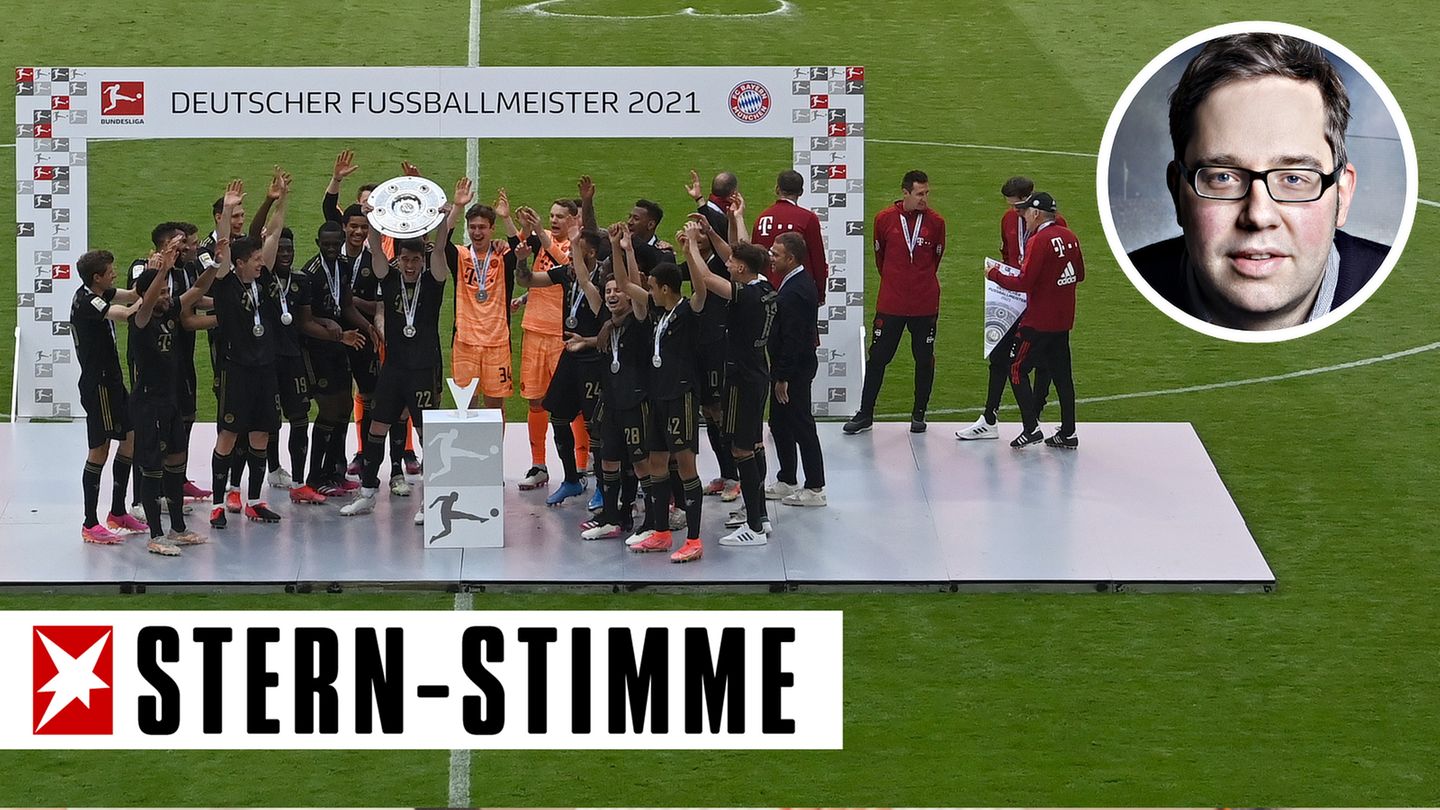The dominance of FC Bayern robs the Bundesliga of its most important asset: tension. If football itself does not manage to change that, politics must act. Says stern– Voice of Philipp Köster.
It was perhaps the most depressing seven minutes of this Bundesliga season – those minutes in which FC Bayern humiliated their pursuers Bayer Leverkusen with four goals in a row in the first half. The 1: 5 away win made the Munich team leaders again. And it doesn’t take much imagination to predict the championship title for Bayern again, for the tenth time in a row.
There has been a lot of debate in recent years about how the dominance of the record champions can finally be broken and how tension can be brought back into the fight for the title. Sometimes former functionary Uli Hoeneß gave the competition the helpful tip to simply try harder, sometimes without result they thought about a closed league modeled on the major US leagues, in which the most attractive clubs would gather without relegation or promotion.
Philipp Köster: Cabin Sermon
Philipp Köster, born in 1972, is the founder and editor-in-chief of the soccer magazine. He collects jerseys and stadium books, knows the Romanian champions from 1984 and can recite Borussia Dortmund’s starting eleven in the 1986 relegation game against Fortuna Köln by heart: Eike Immel, Frank Pagelsdorf, Bernd Storck, … He is also the author of numerous football books, including about the history of the Bundesliga, and was named “Sports Journalist of the Year” in 2010. And above all: supporters of the famous first division club Arminia Bielefeld.
Such talk has changed nothing. And in the meantime, the bigger clubs and the umbrella organization DFL have come to the alarming assessment that a league in which the champions are always determined before the season starts is difficult to market. An absolute core element of the sport is tension, and every runaway victory by FC Bayern is just as detrimental to it as the resignation with which the competition meets the Bavarian superiority. Whether Dortmund, Leipzig or Leverkusen – the goal of the season is everywhere to qualify for the Champions League. Nobody speaks of the championship title anymore, except in Munich, where the championship trophy is accepted every year more boredly.
Football needs a European wage revolution!
So it takes a game changer to clear the wasteland. A real revolution, if you will.
For many officials, the softening or, better still, the abolition of the 50 + 1 rule appears to be the silver bullet out of this misery. They look jealously over to the English Premier League, which has become a playground for wealthy investors in recent decades and where clubs go from relegation candidates to top clubs overnight, as is now happening with Newcastle United, which has been taken over by a Saudi sovereign wealth fund. The planners believe that such financial injections could also revitalize clubs in this country.
Alone, hope is deceptive. The Premier League’s economic success model cannot be copied. Because it is less based on the financial strength of investors than on the commercialization that has been consistently and mercilessly carried out since it was founded in 1992. And also on the global attractiveness of the league, which is based on British football history, but also on the past as a colonial power, and the resulting international TV contracts and advertising deals. To put it humorously with the experienced Bundesliga manager Heribert Bruchhagen: “Back then we shouldn’t have given away the colonies in exchange for Heligoland.” The differences are considerable. Schalke, Cologne and Hamburg may be internationally known brands – they are light years away from the charisma of Chelsea, Arsenal and Tottenham.
No, the revolution is not a German one, but a European one. A radical reform of financial flows in the continent’s leagues is needed. In other words: there must be clear upper salary limits, Europe-wide, without loopholes, strictly controlled. The television money for the Champions League must be redistributed and distributed more fairly. The sometimes horrific consulting fees have to be capped. And the clubs are only allowed to spend on the transfer market what they have generated themselves.
Fans support the system – politics could save it
All of this has been on the table for a long time. The fact that their implementation has failed is due to the manifest unwillingness of the big clubs, which, despite constant public expression of the common good, have no interest in changing the status quo. It is at least as much due to the lack of unity among the European associations to actively tackle regulation. And of course we, the supporters, are also to blame. Because in the end we go to the stadium and turn on the TV when the Champions League anthem sounds. All of this still makes the football business so profitable.
So who can save football? Surprising answer: politics. An EU initiative is needed that will put a stop to the excesses of top international football and give it a stable, economic and administrative framework. The European Union has already regulated and pacified so many branches of the economy. There’s no reason why she shouldn’t be able to do the same in the soccer business. And if the politicians in Italy, France, Spain and Germany can agree on legal regulations, then something could succeed that younger fans only know from anecdotes: An exciting title fight in the Bundesliga until the last day of the game. And possibly even a champion who is not called Bayern Munich.
I have been working in the news industry for over 6 years, first as a reporter and now as an editor. I have covered politics extensively, and my work has appeared in major newspapers and online news outlets around the world. In addition to my writing, I also contribute regularly to 24 Hours World.




